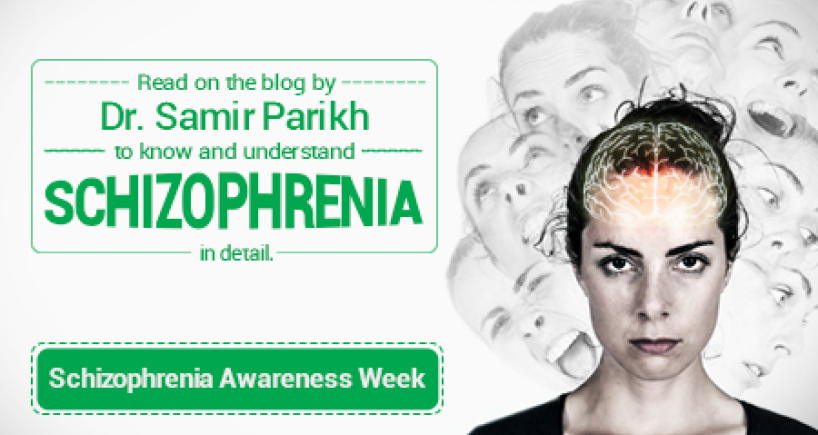
Understanding Schizophrenia

With growing awareness in the field of mental health, it is not uncommon to hear the word schizophrenia being referred to as a severe mental illness or condition by some of the laymen. However, it is sometimes startling to note the various connotations which are typically attributed to the same condition. While it is a relief that our society has evolved from the demystification of mental illnesses rooting from various mythologies, from such patients’ illnesses being attributed to evil powers, from being chained up or treated inhumanely, to the advancements in the facilities and awareness today. However, there still exists a huge stigma attached to mental health, and it is not singularly uncommon to observe a hesitation in reaching out for help across many sections of the society till date. Therefore, as we commemorate the Schizophrenia Awareness Week, it is important to increase our knowledge about this prevalent psychiatric condition in order to ensure a more sensitized approach towards mental health in the future.
Schizophrenia is a psychiatric disorder in which the individual seems to be behaving in a manner that is difficult to comprehend within the real world. Further, such an individual is typically not aware of his or her own unusual behavior. It is a condition that marks the diagnostic category of psychosis, in which the symptoms typically lead to a significant interference in the person’s ability to comprehend and respond to the world in a normal or expected manner.
Signs and symptoms
The key features that define the psychotic disorders including schizophrenia include the presence of hallucinations, delusions, disorganized thinking (which is manifested in the individual’s speech), grossly disorganized or abnormal motor behavior, and other negative symptoms like a lack of motivation or reduced emotional expressions. These symptoms of schizophrenia have originally been classified in the form of positive and negative symptoms.
The positive symptoms are so named because they are marked by the presence of some symptoms which are ‘abnormal’ or distorted mental processes, thoughts, perceptions, feelings or behaviors. Hallucinations are the person’s sensations which are very vivid, but without the actual presence of a stimulus. They are most commonly auditory or visual, but can also be olfactory, tactile and even gustatory at times. A delusion is an individual’s false belief, which is firmly held and persist despite the presence of any contradictory evidence. Such delusions could be believing that others are conspiring or plotting against the individual, a belief that external events or phenomena are being targeted at the individual, or believing that the person is a superior power, etc.
Individuals with schizophrenia typically speak incoherently, and they might not be able to recognize the fact that others around them cannot comprehend what they are saying. Such a disorganized speech could manifest itself in various forms of formal thought disorders, including rapidly shifting from one idea to another, random stream of seemingly unconnected words, making up new words, etc. Finally, disorganized behavior is behavior which is so unfocused and disconnected from a goal that the person cannot successfully accomplish a basic task, or the behavior which is inappropriate in a particular situation. It could include laughing inappropriately to a relatively serious matter, or sexually inappropriate behavior being exhibited in front of others, or being unable to dress oneself appropriately.
On the other hand, negative symptoms are those symptoms of schizophrenia that are marked by the absence or reduction of normal mental processes, contents or behaviours. They could include a lack of or diminished emotional expression, often robotically, responding slowly or minimally to questions, and difficulty in initiating or following through with activities.
The following are some of the identifying signs of schizophrenia:
- Sudden suspiciousness or mistrust
- Bizarre or inappropriate behaviour
- Irrational angry or aggressive behavior
- Hearing or seeing something that isn’t there
- A constant feeling of being watched
- Lack of motivation
- Unusual body positioning
- Preference to stay aloof
- Change in personality
- Decline in academic or work performance
- Significant interference in social and occupational functioning
- Neglect of self-care
Causes
There is no single causative factor that has yet been clearly implicated in the etiology of schizophrenia. However, it has been well established that the disorder tends to run in families, thereby implying the evidence of genetic factors. Further, the role of an imbalance in the neurotransmitters in the brain (serotonin and dopamine) have been found to affect the way a person reacts to stimuli, and has been implicated in the etiology of schizophrenia.
Treatment and Seeking Help
The role of professional help for the management of psychotic disorders is irreplaceable. Pharmacological approaches to treatment are the evidence-based treatment paradigms which regulate the levels of dopamine in the brain, which thereby influence the individual’s cognition, perception and behavioral patterns. In addition, psychological support can be beneficial in helping not just the individual to lead a meaningful life, but can also help the family members and caregivers to learn to manage and cope with the condition better. Cognitive behavior therapy can help the person to learn to distinguish the symptom from reality, work on compliance, and develop more effective coping strategies. Finally, the role of family therapy as well as group therapy are also extremely beneficial, in improving the interaction patterns among the family members, and building on their social skills training to improve their social skills. Moreover, in some cases, especially those with a poor prognosis, psychosocial rehabilitation is very beneficial, as it can help the person build on skills necessary for employment, socializing, problem solving and stress management. In some cases, residential treatment or hospitalization may be necessary.
Categories
Clear allMeet the doctor

- Mental Health and Behavioural Sciences | Mental Health and Behavioural Sciences | Psychiatry | Clinical Psychology
-
21 Years
-
900



















